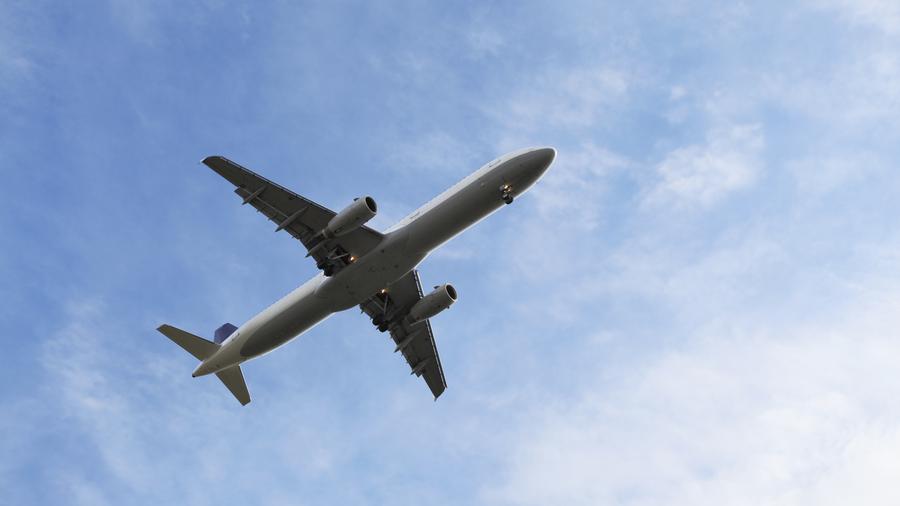Listen to this article 5 min
The aviation industry is coalescing around an effort to scale up the production of lower-carbon fuels to reduce emissions in the traditionally fossil fuel-intensive market.
Airlines, manufacturers, trade groups and others announced April 29 the Sustainable Aviation Fuel Coalition, a nonprofit to promote and advance sustainable aviation fuels. The groups include Alaska Airlines, American Airlines, GE Aerospace, the Boeing Co., JetBlue, United Airlines and San Francisco International Airport.
Sustainable aviation fuel, as defined by the organization, would include using biomass and waste to create an alternative jet fuel without massive changes to either jet engines or airports. The technology is there — and more is being developed all the time — but it's still more expensive by a factor of two or four times current fuel prices.
The Sustainable Aviation Fuel Coalition wants to see federal policies that would help create a robust domestic market with lower prices and higher supply.
"SAF will enhance domestic energy security, create new markets for American farmers, reduce aviation emissions and drive next-generation technology development," said SAF Coalition Executive Director Alison Graab.
Coalition members include:
- Advanced Biofuels Canada
- Air Line Pilot Association, International
- Airlines for America
- Alaska Airlines
- American Airlines
- American Carbon Alliance
- American Express Global Business Travel
- Atlas Air
- The Boeing Company
- Bracewell LLP
- Cincinnati/Northern Kentucky International Airport
- Darling Ingredients
- Enviva
- Fulcrum BioEnergy
- GE Aerospace
- Gevo
- Global Business Travel Association
- Green Plains
- Growth Energy
- Hawaiian Airlines
- International Airlines Group
- JetBlue
- LanzaJet
- LanzaTech
- NetJets
- POET
- Port of Portland
- Port of Seattle/Seattle-Tacoma International Airport
- Renewable Fuels Association
- RSM LLP
- San Francisco International Airport
- Spokane International Airport
- Sumitomo Corporation of Americas
- Summit Agricultural Group
- Topsoe
- Twelve
- United Airlines
- Velocys
- VeriJet
- World Energy
- XCF Global Capital
The group's formation comes as several companies and organizations in the Houston region are also working on SAF efforts. A report released by the Sustainable Aviation Futures North America Congress in July 2023 highlighted facilities producing SAF and renewable diesels, including several created by companies with a Houston presence.
Companies with a Houston presence named in the report include Chile-based HIF Global, which tapped London-based chemicals company Johnson Matthey and North Carolina-based Honeywell (Nasdaq: HON) for its planned SAF plant south of Houston. HIF, which has its U.S. headquarters in Houston, said the plant would produce over 11,000 barrels per day of SAF. The company received permitting approval from the state of Texas in May.
Other Texas projects include Sacramento, California-based Infinium’s multiple planned projects to develop electrofuels, which are made using renewable energy, hydrogen and recycled carbon dioxide for heavy transport sectors.
Shortly after the report was released, Houston-based engineering firm McDermott International Ltd. announced a master services agreement with Colorado-based biofuels company Gevo Inc. (Nasdaq: GEVO) to provide engineering and planning services for multiple SAF plants across the nation, with the first one to be located in South Dakota.
Meanwhile, Houston-based Cemvita Corp. uses a library of microbes to turn carbon dioxide and waste products into feedstocks that can be further refined to create products such as SAF. Last year, the company hit a major milestone when it secured a deal with United Airlines (Nasdaq: UAL) to produce up to 1 billion gallons of SAF.
More recently, Boston-based World Energy was invited in March to apply for the Department of Energy’s Title 17 Clean Energy Financing program to turn a long-serving biodiesel facility on the Houston Ship Channel into a plant that can produce 250 million gallons of SAF annually.
Sign up here for the Houston Business Journal’s free morning and afternoon daily newsletters to receive the latest business news impacting greater Houston. For more business intelligence, follow us on LinkedIn, Facebook, X (formerly known as Twitter) and Instagram.





